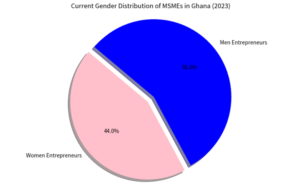… A catalyst for economic prosperity
Ghana’s economic rise in West Africa is marked by a burgeoning middle class and diverse industries. Amidst this transformation, women entrepreneurs stand out not just as participants but as catalysts for sustainable growth and social development. The article draws upon Ghana’s rich Ananse folklore as a metaphorical lens to view these women’s resourcefulness, resilience, and ingenuity.
The tale of Aso (a.k.a Okonore Yaa, Crooky, or Shi Maria) rescuing her husband Ananse serves as a powerful metaphor for the transformative role women entrepreneurs are playing in Ghana. This story not only challenges traditional gender roles but also highlights universal traits like resourcefulness and creativity that are essential for driving positive change.
The narrative culminates in a compelling question: if Aso could achieve so much with limited resources, what could modern women entrepreneurs accomplish with today’s tools, education, and supportive policies? This question invites us to transcend traditional gender roles and societal norms to fully recognize the transformative potential of women in business.
Women Entrepreneurs Across Sectors
According to the Global Entrepreneurship Monitor, women constitute approximately 46% of the entrepreneurial workforce in Ghana. This figure is not merely a statistic; it serves as a testament to the significant strides women are making across various sectors, from agriculture and healthcare to technology and education. In agriculture, women entrepreneurs are particularly active in food crop farming. They are not just farmers but innovators, introducing sustainable farming techniques that are both eco-friendly and yield-enhancing.
In healthcare, women are increasingly taking up roles not just as nurses and doctors but also as healthcare entrepreneurs. They are behind initiatives that focus on community health, maternal care, and telemedicine services, particularly in rural areas. A World Bank study on the gender gap in self-employment in Ghana suggests that structural factors, which could include societal norms and discrimination, play a significant role in the wage gap. However, despite these challenges, women in healthcare are making a difference, especially in underserved communities.
The technology sector in Ghana has seen a surge in women-led startups, especially in software development and tech solutions. Women are actively participating in coding bootcamps, and some have gone on to develop apps that solve real-world problems. In education, women entrepreneurs are focusing on early childhood development and special needs education. They are also leveraging technology to provide remote learning solutions, a need that has become more apparent due to the COVID-19 pandemic.
Women entrepreneurs serve as the ‘vines’ that pull the economy towards prosperity, much like Aso in the Ananse story. A study by the World Bank suggests that a significant increase in the female literacy rate could produce an increase in real output growth by about one-half. This is crucial for Ghana’s aim to scale up growth rates to 8-10% to become a middle-income country within 10 years and to meet the Millennium Development Goals.
Despite these contributions, women entrepreneurs face several challenges, including access to credit and gender-specific constraints that limit their ability to turn capital injections into greater profits. However, initiatives like the Fund for Small and Medium Enterprise Development (FUSMED) are providing technical assistance and financial support to women entrepreneurs.
The influence of women entrepreneurs in Ghana is as widespread as it is impactful. They are indeed the ‘vines’ that are pulling the economy out of the pit, just as Aso did for Ananse. As Ghana continues to develop, the role of women entrepreneurs will undoubtedly become even more significant.

The Resilient Vines: Overcoming Challenges to Thrive in Ghana’s Economy
Women entrepreneurs in Ghana face a myriad of challenges, yet their resilience and ingenuity have enabled them to make significant contributions to the economy. According to a report by the World Bank, women-led SMEs constitute about 50% of all SMEs in Ghana, a figure that underscores their economic importance. One of the most significant challenges they face is limited access to funding. A World Bank study on financial services for women entrepreneurs in the informal sector in Ghana revealed that existing financial services often fall short of meeting the capital needs of women-led businesses.
Societal stereotypes and traditional gender roles also serve as barriers. A World Bank study on gender analysis and policymaking for development in Ghana highlighted that gender inequalities often limit women’s participation and contribution to the economy. Intrahousehold dynamics further complicates the picture. A recent World Bank report found that women often hide income and sometimes limit investment to reinforce their husband’s responsibilities as a primary provider, affecting the growth potential of their businesses.
Despite these challenges, women entrepreneurs have shown remarkable resilience. According to a 2023 report, Activa International Insurance Company Ghana developed targeted insurance solutions for Ghanaian women, recognizing the first-mover advantage in Ghana’s women’s insurance market. Women entrepreneurs have been particularly active in sectors like agribusiness, transport, construction, energy, and ICT services.
Overall, the challenges are many, but the triumphs are significant. Women entrepreneurs in Ghana are not just surviving; they are thriving, contributing to both economic growth and social development. Their resilience and ingenuity serve as the ‘vines’ that pull the economy towards prosperity, much like Aso did for Ananse in the well-known tale.

The Supportive Web: Community and Policy
The success of women entrepreneurs in Ghana is not an isolated phenomenon but rather a collective effort that involves supportive policies, community engagement, and access to vital resources. The Ghanaian government has been proactive in this regard, initiating several programs aimed at bolstering the entrepreneurial landscape for women. One such initiative is the National Entrepreneurship and Innovation Plan (NEIP), which has been instrumental in providing business development services, startup incubators, and funding for women entrepreneurs. According to a 2021 report, NEIP has trained over 45,000 entrepreneurs, 60% of whom are women, and has disbursed grants to over 9,000 businesses, with a significant portion going to women-led enterprises.
Community engagement also plays a crucial role. Local NGOs and women’s groups often collaborate with government agencies to provide mentorship programs, networking events, and skill-building workshops specifically tailored for women entrepreneurs. For instance, the Ghana Women Entrepreneurship Summit (GWES) has become an annual event where women entrepreneurs can network, learn, and showcase their businesses. The summit reported a 20% increase in attendance in 2022, indicating growing interest and support for women in business.
Access to resources, both financial and informational, is another pillar supporting women entrepreneurs. Microfinance institutions and banks have introduced special loan schemes for women entrepreneurs, recognizing their growing influence in the economy. A 2022 study revealed that women who accessed these financial services saw an average revenue increase of 30% within a year.
The synergy between government policies, community support, and resource availability creates a conducive environment for women entrepreneurs to thrive. This supportive web not only enables women to overcome challenges but also amplifies their contributions to economic growth and social development.
The Multifaceted Impact: A Synergy of Economic Growth and Social Development
The transformative power of women entrepreneurs in Ghana is not just confined to the business sphere; it reverberates through both the economy and society, creating a multifaceted impact that can be best described as “Socio-Economic Synergy.” According to recent data from the World Bank, women-led businesses contribute significantly to job creation, accounting for approximately 40% of all employment in the small and medium-sized enterprise (SME) sector in Ghana. This is not just a statistic; it translates into real economic value. The African Development Bank estimates that increasing the participation of women in the economy could amplify Ghana’s GDP by a staggering 12%.
But the influence of women entrepreneurs extends beyond mere numbers and into the realm of social betterment. Their ventures often serve as conduits for social change, aligning closely with the United Nations’ Sustainable Development Goals. For instance, about 35% of women-led SMEs in Ghana are involved in initiatives that directly contribute to community development, environmental sustainability, and social responsibility, according to the World Bank. These initiatives range from educational programs to waste management solutions, thereby creating a holistic impact that transcends the traditional boundaries of business.
In essence, the role of women entrepreneurs in Ghana is a vivid illustration of how business acumen and social consciousness can coalesce to create a ripple effect that benefits not just the economy but society at large. This synergy between economic and social impact underscores the indispensable role that women entrepreneurs play in the sustainable development of Ghana.
Conclusion:
Women entrepreneurs in Ghana are not just contributing to the economy; they are essential for both economic growth and societal improvement. In essence, the role of women entrepreneurs is akin to the wisdom of Aso in the well-known Ananse story. Just as Aso’s ingenuity was indispensable in rescuing Ananse, the multifaceted contributions of women entrepreneurs are invaluable in shaping Ghana’s sustainable future. Their influence serves as a testament to what can be achieved when economic ambition is harmoniously blended with social consciousness.










